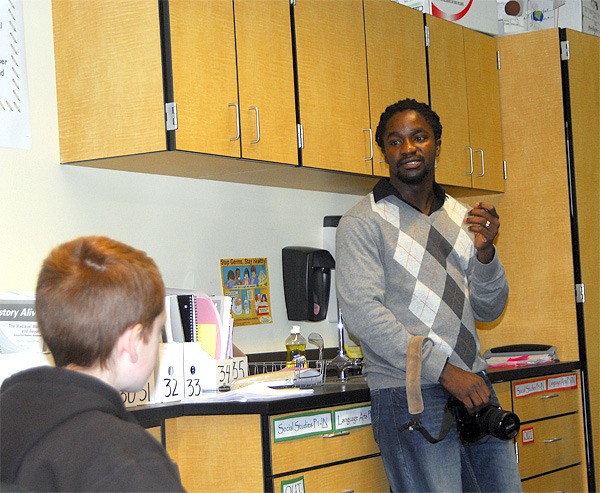By Carol Ladwig
Staff Reporter
Math may not be their strongest suit, but the eighth graders in Emily Rourke’s geography enrichment class at Twin Falls Middle School definitely know the numbers on their current project.
“A child in Africa dies… it’s every 30 seconds, from malaria,” said Halee.
“From the time we get off the bus to the time the bell rings, 40 kids in Africa died,” said Ben, illustrating it for fellow students.
The mosquito nets that could save their lives cost only $5 each, and can last up to three years. The class has a goal of raising $2,000 by November 18 to buy the nets for a clinic in Kenya.
So far, Rourke reports that they’ve raised $150.
“How many nets is that?” she asks the class. A lengthy and loud discussion ensues. Several students call out answers, right and wrong, before one boy emphatically states “30 mosquito nets!”
In another classroom, Rourke’s students were giving a presentation. They asked the students in the room to stand up, representing all the children in Kenya, and then to sit down, visually demonstrating malaria-related deaths, hospitalizations, and so on, to the last six students. Then Anna tells them, “If we have the insecticide-treated mosquito nets, we can save half of you.” Three more sit down.
Down the hall in Mrs. Treadwell’s classroom, native Kenyan Simon Okelo is helping with another student presentation, and telling stories about growing up with the disease.
“As you grow up, you get malaria so many times… I’m 26 years old and I’ve had malaria 30 times,” he said. During one illness, he said he wanted to “be tough” and not go to the hospital, but then he passed out during an important meeting, and was persuaded then to seek medical help.
Malaria is caused by several species of plasmodium parasites, and it spreads primarily by Anopheles mosquitos, found in every continent except Antarctica. Mosquitos bite infected people, and then bite uninfected people, transferring the parasite, but if the mosquito rests between meals on a mosquito net treated with insecticide, the infection cycle ends there.
There is no vaccine, and the disease can be deadly if left untreated.
“It’s a lot like a seasonal flu,” explains Rebecca, Simon’s wife. “You get fever and chills, only it’s an infection that you must treat.”
Treatment is a course of antimalarial drugs such as quinine sulfate and chloroquine, and at the Mbitu, Kenya clinic that the students are helping with the project, it costs 50 cents.
Rebecca said no one is turned away if they can’t afford the treatment, because the clinic was opened by Med25 International, which takes its name and philosophy from Article 25 of the Universal Declaration of Human Rights: Everyone has the right to a standard of living adequate for the health and well-being of himself and of his family, including food, clothing, housing, medical care and necessary social services.
Med25 has partnered with Twin Falls because of Rourke’s relationship with Rebecca Med25’s executive director. The two met earlier this year when Rebecca was a nurse at Virginia Mason Hospital, caring for Rourke’s father. Rourke learned about Rebecca’s efforts in Kenya, and prior to that in Ghana with HIV patients, and knew she’d found the project for her students.
She asked the Okelos to talk with her class about the clinic and the need for the nets last week, which was all the motivation many of the students needed.
“When I heard Simon’s story, I was just so inspired,” said Hailey, one of the presenters. “He’s had malaria about 30 times.”
“I really wanted to help out, and help save lives,” Anna added.
Since then, the students have been hanging signs all over the school urging people to donate, selling snow-cones, reading announcements, and making special certificates for people who want to donate a mosquito net as a gift.
“A vision that I have is for kids and parents to make a donation in someone else’s name,” Rourke said. “How great would that be, to get away from some of the commercialism of the holidays?”
“Four hundred nets will have taken care of 400 mothers, and 400 babies, so that’s 800 individuals you’re helping,” Simon reminded the students, concluding the presentation in Treadwell’s classroom.
The fundraiser runs at the school through the 18th, and will continue the following week with a bake sale at the parent-teacher conferences.
To make a donation, contact Emily Rourke at Twin Falls Middle School.
For more information about Med25 International, visit www.med25.org.


